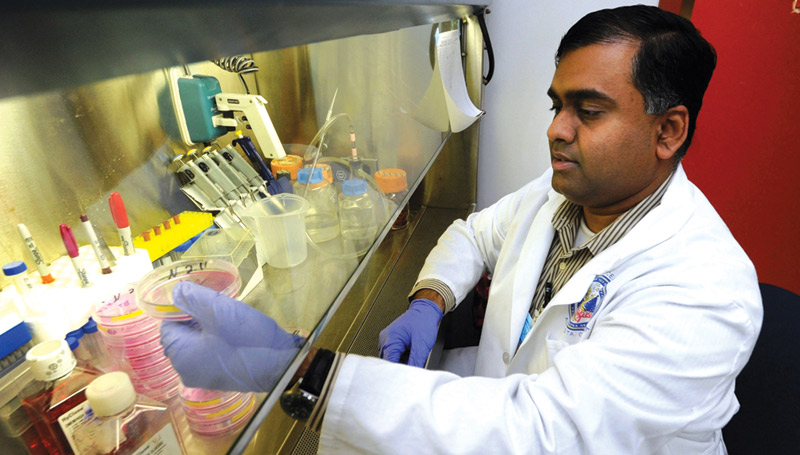Growing up in a family of scientists had a great effect on Ying Xu’s career. With two chemistry professors for parents, he was exposed to science at a very early age. However, it was his uncle, a computer scientist, who encouraged him to study computer science or mathematics.
Xu obtained his Ph.D. in applied mathematics from the University of Colorado Boulder. During his doctoral studies, Xu knew very little about biology. Learning about biological research was a long process, shaped by his early career experiences.
“Oak Ridge National Laboratory was looking for someone who knew mathematics and statistics to be part of the Human Genome Project,” he said. “Through this project, I learned about evolution, genes and genomic structure.”
Afterward, Xu continued working on biology projects, such as the Genomes to Life project for the Department of Energy, where he was tasked with understanding the role of bacteria in the carbon cycle. Along the way, Xu wrote multiple books on bioinformatics and computational biology.
“I try to leave a mark in whatever I do,” he said. “I wanted to write as a way for me to develop a system-level understanding of these topics.”
In 2003, the University of Georgia recruited Xu to help establish the Institute of Bioinformatics. He is currently Georgia Research Alliance Eminent Scholar of Bioinformatics at UGA, where he uses computational and systems biology approaches to study cancer biology.
Longstanding questions about cancer, such as what causes it and what factors influence tumor growth, are what motivate Xu. And recent results from his research group may change our understanding of the disease.
“Since the 1970s, experts have been considering genetic mutations as the driver of cancer, but more researchers are starting to challenge this mainstream thinking.”
In targeted therapy—one of the main applications of the genetic mutations theory—drugs such as Gleevec are developed to block cancer-causing mutations. However, Xu said, some patients become resistant to such drugs after a short period of time.
“If mutations are the ultimate driver for cancer, then by blocking them we should be able to stop the disease,” said Xu, whose appointment is in the Department of Biochemistry and Molecular Biology in the Franklin College of Arts and Sciences. “But because of drug resistance, more people are starting to think that the cause of cancer is much more complex than just genetic mutations.”
Researchers have also considered how cancer cells generate energy as a probable cause of the disease. Cancer cells are known to switch from the more efficient process of respiration to another, less efficient process known as fermentation, an observation made by German biochemist Otto Warburg in 1927. At the cellular level, switching to fermentation causes cancer cells to require significantly more nutrients (particularly glucose) than normal cells. Current cancer detection methods utilize this fact as the basis to detect whether some parts in a patient’s body have a much higher-than-normal glucose metabolism and, hence, cancer.
Research findings from Xu’s group suggest that other metabolic changes within cancer cells may be involved in the development and progression of this disease. Through computational analysis and mathematical modelling, Xu and his group examined the information in an online database, The Cancer Genome Atlas, which houses molecular data for more than 10,000 cancer tissue samples covering 32 different types of cancer.
“It is an exciting thing to try, on a daily basis, to understand the root causes of cancer through mining molecular data,” he said.
From their analysis, Xu’s group observed changes that take place in the microenvironment where cancer will develop later on.
According to Xu, there are cellular markers—signals that can be measured—to identify whether a certain metabolic process is occurring at a rate higher than in normal cells. After examining several kinds of stress markers in cancer data, Xu’s group, working with a team of researchers at China’s Jilin University, found over 50 altered metabolic processes in virtually all cancer data they studied. All these altered metabolic processes, called “reprogrammed metabolisms,” had one thing in common: They produce protons at levels significantly higher than the original processes in healthy counterparts.
Earlier, Xu’s group had discovered that the same set of cancer samples harbor intracellular Fenton reactions due to chronic inflammation and local accumulation of iron, which produce highly reactive particles called hydroxyl radicals and hydroxides (OH–). There are other research groups in the world that study Fenton reactions in cancer but all focus on the damaging effects of hydroxyl radicals. In contrast, Xu’s group studies the seemingly harmless hydroxides; together with protons (H+), they make water molecules (H2O). The persistent production of OH– over years will increase the pH level of the affected cells. If not neutralized, the increased pH will change how proteins fold, thereby changing their function and ultimately killing the cell.
Using statistical analysis and mathematical modelling, Xu hypothesized that the two classes of cellular processes, some 50 reprogrammed metabolisms and Fenton reactions, are related. In his new model, reprogrammed metabolisms are a cellular survival response to the alkalizing effects of Fenton reactions.
Xu’s model looks at cancer as a stress-driven process, where cell division is part of the survival process. Cells counteract the alkalization through increased proton productions, which also create byproducts such as nucleotides—the basic building block of DNA—in the process. Their accumulation will slow down and ultimately stop the acidification process, killing the cells with alkaline pH.
In Xu’s model, the cells rapidly divide—a characteristic feature of cancer—to remove the nucleotides from the cells by chaining them together to form DNA and then dumping that DNA chain into a new cell, sustaining the nucleotide synthesis-based acidification to keep cells’ pH within a viable range. That is, persistent cell division provides a sustainable way for Fenton reaction-affected cells to survive.
The new findings, published in the most recent issue of the journal Cancer Research, may have significant implications for the current understanding of cancer, as well as open new avenues for cancer treatment. The team’s more recent work suggests that other behaviors of cancer, like metastasis and drug resistance, may be the result of other reprogrammed metabolisms.
“Our work suggests a new type of drug target for killing cancer cells via stopping the key acidifiers that keep the cells’ pH within a normal range and hence alive,” Xu said. “The main challenge will be to identify the most effective acidifier in individual cancers or cancer types and ensuring that inhibiting this process will not interfere with normal cell functions.”






